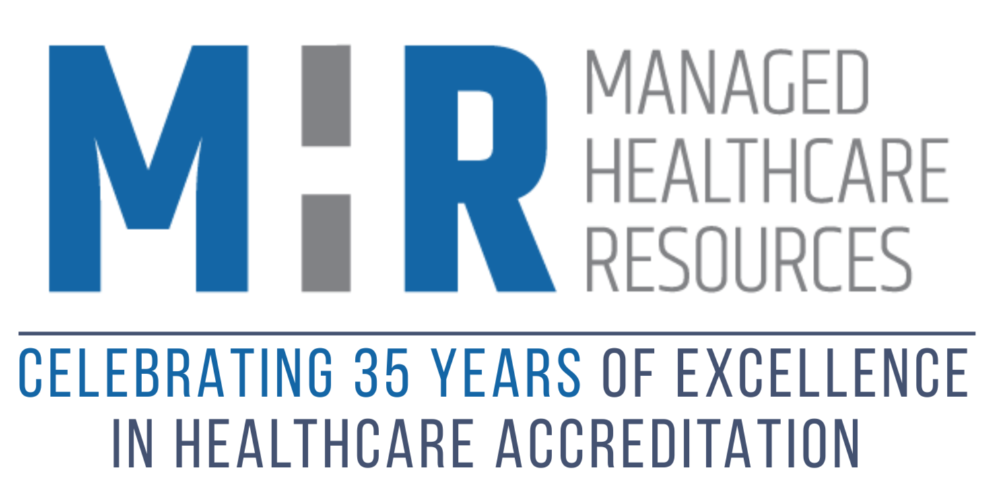Case Study #1: A Medicaid Plan with Great Complexity and Need
MHR had taken a Medicaid plan through accreditation for a First Survey previously.
Because they did not have seasoned accreditation staff, MHR consultants mentored the staff to successfully achieve 100% on the survey. This included a readiness assessment for a baseline, documentation review and development, data identification for report development, analysis writing, periodic file reviews for medical management, case management, and appeals, document preparation for the file review, file universe development, and file preparation for the survey.
When starting to prepare for their Renewal Survey, the previous Director of Quality and the Accreditation Manager had both moved to other organizations, which seems to frequently occur. An Accreditation Manager who had worked for a Medicaid health plan in another state started working for the organization two years prior to this survey, just within the 24-month look-back period for a Renewal Survey. This new Accreditation Manager and her Director, who had no accreditation experience and had recently moved to that position, had difficulty navigating the complex Purchase Order and Statement of Work process for this organization to bring on the consultants quickly. Additionally, they wished to try to bring more standards into compliance prior to having the consultants review documentation. Consequently, six months went by prior to being able to engage in consulting services for the organization.
Although the organization had a foundation of documentation to work with that was previously compliant, they needed to build on those. This was due to an additional standard set that had not been in existence previously (population health management), increased requirements for existing standards, and the requirement to have two years of documentation for a Renewal Survey instead of the six-month requirement for First Surveys. All organizations struggle when moving from First Surveys to Renewal Surveys due to the annual requirements and “throughout the look-back period” requirements. The consultant team performed a gap analysis of all the documentation and the health plan team started on gap closure. After this initial work, the rate of mitigation slowed.
This was a health plan in one state out of a complex national organization that had been involved in major mergers and acquisitions between the two survey periods. The national organization had re-organized, many new staff were now with the system, and job responsibilities had changed. Although the MHR lead consultant had previously worked with this national organization and been responsible for accreditation, the navigation of the system was still a challenge. Staff responsible for standards were difficult to locate, and when located, frequently stated they had no responsibility for the function or did not provide the deliverables within the needed timeframe. The Director was hesitant to involve the CEO, although the CMO was involved and knowledgeable about the situation. The consultants implemented standard monthly to bi-monthly to weekly phone calls with the accreditation team, along with other workgroups, to attempt to propel the project forward. Due to the many barriers, progress was slow and there were a myriad of gaps to fill.
Eight weeks prior to the survey submission, the Manager of Accreditation, who was responsible for project management, tracking, document preparation, and submission, decided to retire and resigned with two weeks’ notice. Two weeks later, the Director resigned to take a job with another organization. The CEO became involved and asked for MHR’s all-hands-on-deck approach. This meant that the consultants led and managed the project (using the MHR proprietary project management tool), led the overall accreditation meetings, reviewed all previously prepared documents by staff that MHR had not been involved with, and assisted in identifying all gaps. Besides the main gaps that were found in the review of documentation, there were major data issues remaining that the internal team was supposed to manage, analyses had not been written, and nothing had been entered into the web-based accreditation submission tool. MHR consultants cleaned up data issues, led sub-groups, developed analyses, supported the committees and prepared committee presentations, assisted in developing the six file universes for submission, and elevated barriers and issues in the weekly leadership meeting. All activities were completed, and all documentation was prepared with bookmarks and highlighting for every standard and element before loading by an assigned consultant into the web-based accreditation survey submission system. The survey submission was completed three hours prior to the deadline for submission.
The consultants assisted with the one identified outstanding issue for the conference call, providing supporting documentation to NCQA, including the answer to a question submitted by the consultant to the NCQA Policy Clarification Support line that supported that the issue was actually met. The organization received 100% on their offsite standards submission.
Two weeks prior to the survey, the listing of the six file review areas was received. The MHR team audited the files with staff and prepped and developed pdfs of the files for the survey. The file review received 100% for medical files with only minimal point loss for behavioral health when letters were not sent in a timely manner by the utilization management department. This meant that the organization received almost 100% of the entire survey for points.
Interested in learning more about our firm?
Complete the quick form below and one of our consultants will be in touch.

